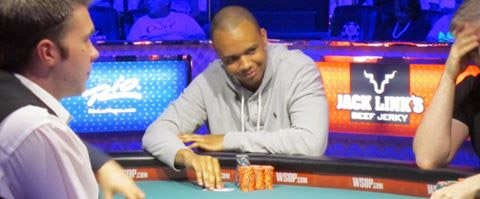| Ivey v Genting Casinos | |
|---|---|
| Court | Supreme Court |
| Citation(s) | [2017] UKSC 67 |
| Cases cited | R v Ghosh |
| Court membership | |
| Judge(s) sitting | Lord Neuberger, Lady Hale, Lord Kerr, Lord Hughes, Lord Thomas |
| Keywords | |
| dishonesty |
LONDON - Ten-time World Series of Poker winner Phil Ivey has lost his case against a British casino he accused of improperly withholding his winnings. Britain's High Court ruled Wednesday that. Feb 07, 2019 The Borgata filed suit against Ivey, Sun, and the card manufacturer way back in 2014, demanding that Ivey return $10.1 million he took from the casino, which included the $9.6 million in baccarat. The recent decision of the Supreme Court in Ivey v Genting Casinos has resulted in a landmark change to the law of dishonesty, overturning a 35 year old test from the case of R v Ghosh.
Ivey v Genting Casinos (UK) Ltd t/a Crockfords [2017] UKSC 67 is a UK Supreme Court case that reconsidered the test used for determining dishonesty.[1]
Facts[edit]
Texas holdem poker blinds schedule. Phil Ivey, an American professional poker player, played and won a series of games of Punto Banco—a variant of baccarat—at Crockfords Casino in London, owned by Genting Casinos (UK) Ltd. The casino did not pay out the £7.7m he had won, as they believed Ivey had cheated by using edge sorting. Ivey sued the casino to recover his winnings.
Both Ivey and the casino agreed that the contract contained an implied term forbidding cheating. Ivey's lawyers argued that the appropriate test for whether cheating occurred was the same for contract as it was in section 42 of the Gambling Act 2005, and that cheating necessitated dishonesty, which had not been shown.
Ivey Vs Casino Slots
At trial, Mitting J held that cheating had occurred and the contract was thus invalid. The Court of Appeal upheld the trial judge's ruling 2–1.

Decision[edit]
The Supreme Court held that Mr Ivey had cheated, and was thus not entitled to the payment sought from Genting Casinos.

Lord Hughes considers at length whether the existing test for dishonesty is acceptable, noting that dishonesty in civil contexts is judged objectively. The court noted, albeit obiter, that the second component of the two-stage test developed by the Court of Appeal in R v Ghosh was inadequate and replaced it with a purely objective test: would the act conducted be considered dishonest by an ordinary, reasonable person?
Reception[edit]
In the High Court case of DPP v Patterson, Sir Brian Leveson observed that:
Given the terms of the unanimous observations of the Supreme Court expressed by Lord Hughes, who does not shy from asserting that Ghosh does not correctly represent the law, it is difficult to imagine the Court of Appeal preferring Ghosh to Ivey in the future.[2]
David Ormerod and Karl Laird criticised the direction of the law following Ivey, arguing that the lack of a subjective element will lead to uncertainty and a possible human rights challenge under Article 7, citing a prior challenge to Ghosh.[3][4]
References[edit]
- ^'Ivey (Appellant) v Genting Casinos (UK) Ltd t/a Crockfords (Respondent)'. The Supreme Court. Retrieved 2019-06-06.
- ^[2017] EWHC 2820, at [16].
- ^R v Pattni [2001] Crim LR 570
- ^Ormerod, David; Laird, Karl (2018). Smith, Hogan, and Ormerod's Criminal Law (15th ed.). Oxford. p. 881. ISBN9780198807094. OCLC1014163712.
External links[edit]
/https%3A%2F%2Fspecials-images.forbesimg.com%2Fimageserve%2F92887264%2F0x0.jpg%3Ffit%3Dscale)
Ivey Vs Casino Stock

Decision[edit]
The Supreme Court held that Mr Ivey had cheated, and was thus not entitled to the payment sought from Genting Casinos.
Lord Hughes considers at length whether the existing test for dishonesty is acceptable, noting that dishonesty in civil contexts is judged objectively. The court noted, albeit obiter, that the second component of the two-stage test developed by the Court of Appeal in R v Ghosh was inadequate and replaced it with a purely objective test: would the act conducted be considered dishonest by an ordinary, reasonable person?
Reception[edit]
In the High Court case of DPP v Patterson, Sir Brian Leveson observed that:
Given the terms of the unanimous observations of the Supreme Court expressed by Lord Hughes, who does not shy from asserting that Ghosh does not correctly represent the law, it is difficult to imagine the Court of Appeal preferring Ghosh to Ivey in the future.[2]
David Ormerod and Karl Laird criticised the direction of the law following Ivey, arguing that the lack of a subjective element will lead to uncertainty and a possible human rights challenge under Article 7, citing a prior challenge to Ghosh.[3][4]
References[edit]
- ^'Ivey (Appellant) v Genting Casinos (UK) Ltd t/a Crockfords (Respondent)'. The Supreme Court. Retrieved 2019-06-06.
- ^[2017] EWHC 2820, at [16].
- ^R v Pattni [2001] Crim LR 570
- ^Ormerod, David; Laird, Karl (2018). Smith, Hogan, and Ormerod's Criminal Law (15th ed.). Oxford. p. 881. ISBN9780198807094. OCLC1014163712.